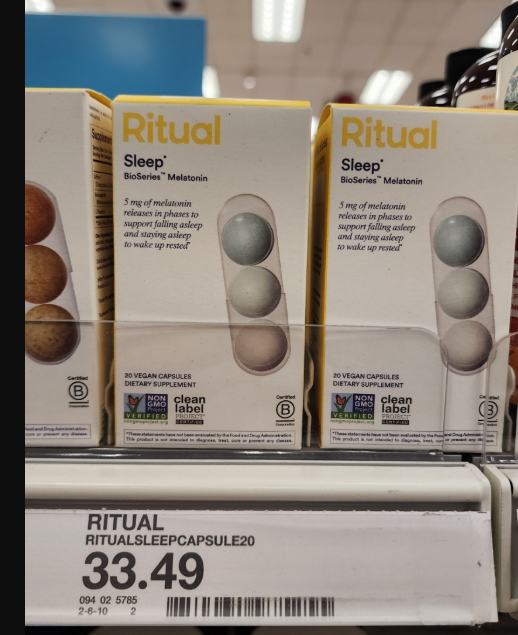What’s Really in Your Supplements? Why USP Testing Matters More Than You Think
- Jonathan Szkotak
.jpg/v1/fill/w_320,h_320/file.jpg)
- Jul 18, 2025
- 3 min read

The surprising truth about what’s in your capsules—and why the “USP Verified” mark is your best friend in the supplement aisle. By Jonathan Szkotak
When I was a pharmacy student, I worked nights at a 24-hour drugstore in Albuquerque. People would roll in at all hours asking which vitamins were “the best.” One woman in particular—I still remember her—came in wearing pajamas and a coat, clutching a bottle of ginseng and asking, “Does this do anything?”
I looked at the label. It made bold promises: “ENERGY. IMMUNE SUPPORT. SEXUAL HEALTH.”
But when I flipped the bottle around, what I didn’t see told me more than what I did: no third-party testing, no verification, and no clue what was actually inside.
That’s when I first started talking to people about USP.
What Is USP Testing?
The United States Pharmacopeia (USP) is a nonprofit, science-based organization that sets quality standards for medications, dietary supplements, and food ingredients. USP testing is not required by the FDA for supplements. That’s right—most supplements on the shelves are not tested for purity, potency, or even whether the ingredients listed on the label are actually in the bottle.
USP’s “Verified” mark means a supplement has passed rigorous tests to confirm:
Ingredient Accuracy: What’s on the label is actually in the bottle
Purity: It’s free of harmful levels of contaminants (lead, mercury, pesticides, etc.)
Potency: It contains the amount of each ingredient listed
Dissolution: It will properly break down in your body for absorption
Good Manufacturing Practices (GMP): It was made in a facility that meets FDA standards
It’s kind of like a TSA pre-check for your supplements.
Why Should You Care?
Because the supplement industry is shockingly underregulated.
A 2015 study published in Drug Testing and Analysis found that over 50% of tested herbal supplements contained DNA from plants not listed on the label, and many lacked the labeled ingredient entirely [1].
Even worse? Some contained harmful substances like prescription drugs, allergens, or heavy metals. A 2019 report from Consumer Reports found dangerous levels of arsenic, lead, and cadmium in protein powders from popular brands [2].
USP verification doesn’t just give peace of mind—it gives evidence that the product is what it says it is.
Not All Third-Party Testing Is Created Equal
Some brands say “third-party tested” and think that’s enough. But here’s the catch—not all testing is transparent. Some companies pay labs that don’t disclose results publicly. Others make their own “seals” that look official but mean nothing.
USP is different. It’s a publicly recognized, nonprofit organization with testing methods codified into U.S. law for medications. That’s why their Verified mark is so meaningful—it’s the gold standard.
How to Find USP Verified Supplements
Look for the USP Verified mark on the label—not just the words “USP” in small print. You can also check the USP Verified website for a list of vetted products.
Some of the better-known brands that often carry USP Verified products include:
Nature Made (select products)
Kirkland Signature (Costco brand)
Member’s Mark (Sam’s Club brand)
Certain CVS or Walgreens store brands
Final Thoughts: Trust, But Verify
As someone who’s sat on P&T committees evaluating drugs for public health plans, I’ve seen what rigorous review looks like. Supplements don’t go through that same review. That’s why we have to rely on science-backed third parties like USP.
If you’re going to invest your money and your health in a bottle of vitamins, don’t take the label’s word for it. Make sure someone who isn’t profiting from the sale has taken a look inside.
Because that bottle might say “B12” in bold letters, but if there’s sawdust and food dye inside, what’s the point?
References
Newmaster SG, et al. DNA barcoding detects contamination and substitution in North American herbal products. BMC Medicine. 2013;11:222. https://bmcmedicine.biomedcentral.com/articles/10.1186/1741-7015-11-222
Consumer Reports. "Protein Drinks: What's in Your Protein Powder?" (2019). https://www.consumerreports.org/dietary-supplements/heavy-metals-in-protein-supplements-a5345295556/
United States Pharmacopeia. “USP Verified Mark.” https://www.usp.org/verification-services/usp-verified-mark
Learn more about Jonathan Szkotak, PharmDHealthcare strategy consultant, former health plan Pharmacy Director, and longtime advocate for evidence-based supplement use.LinkedIn | ResearchGate |




Comments